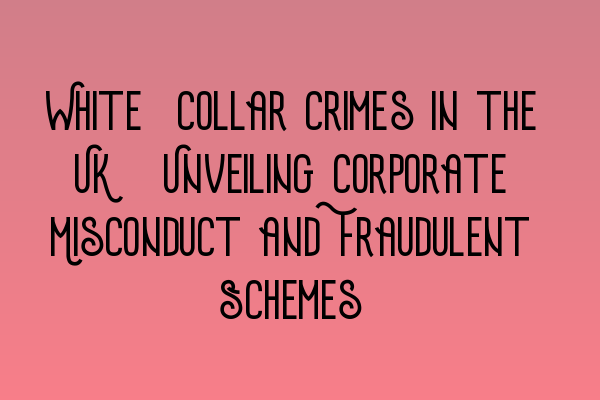White-Collar Crimes in the UK: Unveiling Corporate Misconduct and Fraudulent Schemes
White-collar crimes have become a significant concern in the UK, as corporate misconduct and fraudulent schemes continue to plague the economy and society. These offenses involve non-violent crimes committed by individuals or organizations, usually in a professional or business context. They often revolve around financial fraud, embezzlement, insider trading, money laundering, and other illegal activities.
The Impact of White-Collar Crimes
White-collar crimes pose a substantial threat to individuals, businesses, and the overall economic stability of the UK. The victims of these crimes can suffer significant financial losses, reputational damage, and even bankruptcy. Moreover, the general public’s trust in corporate governance and the justice system can be eroded, leading to a decrease in investor confidence and overall economic growth.
It is crucial to address white-collar crimes effectively to ensure a fair and just society. The criminal justice system plays a vital role in investigating, prosecuting, and penalizing those involved in these fraudulent activities.
Uncovering Corporate Misconduct
Corporate misconduct refers to the unethical or illegal behavior exhibited by individuals within a company or organization. Such behavior can include bribery, corruption, tax evasion, fraudulent accounting practices, or violations of regulatory compliance. These actions not only harm the company but also jeopardize the interests of shareholders, employees, and the public.
In recent years, there have been high-profile cases of corporate misconduct, highlighting the need for stricter regulations, effective monitoring, and enforcement mechanisms. The UK has taken several measures to combat corporate misconduct, including the establishment of regulatory bodies such as the Financial Conduct Authority (FCA) and the Serious Fraud Office (SFO).
To ensure accountability and prevent future misconduct, it is essential for companies to implement robust compliance programs, internal controls, and ethical guidelines. These measures can help detect and deter fraudulent activities, safeguarding the interests of all stakeholders involved.
Fraudulent Schemes in the UK
Fraudulent schemes encompass a wide range of deceptive practices employed to unlawfully obtain money, assets, or personal information. Some common types of fraud prevalent in the UK include:
- Insurance fraud: Individuals may attempt to make false claims or provide misleading information to insurance companies to obtain illegitimate financial benefits.
- Banking fraud: Criminals may use various methods, such as identity theft, phishing, or skimming, to gain unauthorized access to bank accounts or sensitive financial information.
- Investment fraud: Perpetrators may lure unsuspecting individuals into fraudulent investment schemes, promising high returns but ultimately stealing their money.
- Mortgage fraud: This involves providing false information or documents during the mortgage application process to obtain loans or favorable mortgage terms illegally.
- Tax evasion: Individuals or businesses intentionally evade paying taxes by concealing income, inflating deductions, or employing other illegal tax avoidance strategies.
The fight against fraudulent schemes requires a collaborative effort between law enforcement agencies, regulatory bodies, and the public. Organizations should remain vigilant and implement preventive measures to minimize the risks associated with these criminal activities.
Conclusion
White-collar crimes, including corporate misconduct and fraudulent schemes, pose significant challenges to the UK’s legal system and society at large. Addressing these crimes requires a multi-faceted approach involving effective legislation, rigorous enforcement, and public awareness.
At SQE Criminal Law & Practice Law UK, we are dedicated to combating white-collar crimes. Our SQE 1 Preparation Courses and SQE 2 Preparation Courses equip aspiring solicitors with the necessary knowledge and skills to navigate the complex landscape of criminal law.
If you are interested in further exploring the legal profession or need guidance about the SRA SQE exam dates, we invite you to read our related articles:
- SQE 1 Practice Exam Questions
- SQE 1 Practice Mocks FLK1 FLK2
- SQE 2 Preparation Courses
- SQE 1 Preparation Courses
- SRA SQE Exam Dates
Feel free to reach out to us for any legal assistance or to learn more about fighting white-collar crimes in the UK. Together, we can work towards a fair and ethical society.
